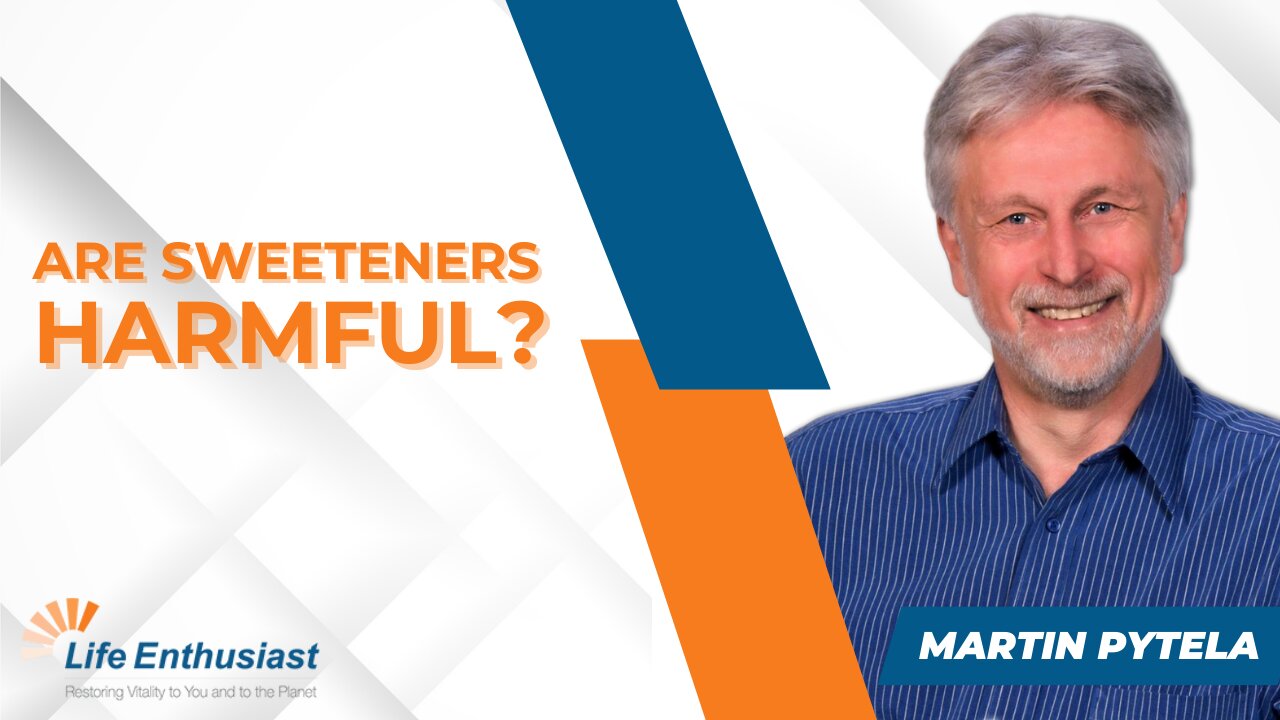Premium Only Content

From Aspartame to High Fructose Corn Syrup: How Harmful Are These Sweeteners?
Watch the full episode at:
https://youtube.com/live/i-AFPMlHoPA
"Top Ten Foods To Detox Your Kidneys"
In our quest for healthier dietary choices, artificial sweeteners have gained popularity as a substitute for sugar. However, their impact on our health is a topic of growing concern, as discussed by Martin Pytela and Scott Paton on the Life Enthusiast channel. Let's dive deeper into the different types of artificial sweeteners, their historical context, and their potential health repercussions.
Stevia, derived from the leaves of the Stevia rebaudiana plant, gained appeal as a natural alternative sweetener. Unlike synthetic options, stevia is touted for being plant-based. However, as Martin pointed out, even natural substitutes can have unintended consequences. Rita's personal account highlights the importance of long-term safety research, even for ingredients that come from natural sources.
The primary motivation behind artificial sweeteners is their ability to provide the sweetness we crave without the caloric intake associated with sugar. That's extremely enticing for those who are weight-conscious or managing diabetes. However, the reality is that reducing calorie intake does not always equate to better health. The potential side effects of these sweeteners call into question their overall benefit.
For example, while aspartame contains virtually zero calories, it breaks down into several components, including methanol, which can be toxic in high amounts. Sucralose, on the other hand, is reported to affect glycemic and insulin responses. Even sugar alcohols like xylitol and erythritol can cause digestive issues when consumed in large quantities.
Martin Pytela succinctly summarized the sentiment shared by many health-conscious individuals: he would rather consume natural sugar than artificial alternatives, including stevia. Natural sugars, when consumed in moderation, come without many of the health risks associated with artificial sweeteners. Honey, agave nectar, and even plain table sugar are preferable options for those looking to avoid artificial ingredients.
As we navigate the complex landscape of dietary choices, it's crucial to remain informed about the ingredients we incorporate into our diets. While the allure of calorie-free sweetness is undeniable, understanding the long-term effects of artificial sweeteners can guide us toward better decision-making. Always prioritize whole, unprocessed foods and consult healthcare providers when making significant changes to your diet.
Artificial sweeteners may offer some immediate benefits, but their potential health implications make it essential to approach them with caution and awareness. Consider moderation, stay informed, and prioritize your overall well-being above the desire for a quick, sweet fix.
10 Questions Covered In This Episode
1. What are the potential health issues associated with the long-term use of stevia based on Rita's experience?
2. How did the various artificial sweeteners such as xylitol, erythritol, aspartame, sucralose, and high fructose corn syrup come into common use as sugar substitutes?
3. What are the claimed benefits of using artificial sweeteners over natural sugar?
4. Martin mentions preferring sugar over artificial sweeteners, including stevia. What are his reasons for this preference?
5. Do you think there is enough awareness about the potential health risks of artificial sweeteners among consumers? Why or why not?
6. How has the regulatory landscape changed for artificial sweeteners since the banning of certain substances like stevia in 1991?
7. What might be some healthier alternatives to both sugar and artificial sweeteners?
8. What roles do consumer demand and industry interests play in the popularity and proliferation of artificial sweeteners?
9. How does high fructose corn syrup (HFCS) compare to other artificial sweeteners like aspartame and sucralose in terms of health impact?
10. Given the downsides mentioned, what could be the long-term societal implications if artificial sweeteners continue to be widely used in our diets?
Fun Facts:
1. Stevia, despite its natural origins, caused significant health issues for some users, including Rita.
2. Artificial sweeteners like aspartame, sucralose, and high fructose corn syrup were created to reduce calories but can have negative health effects.
3. The preference for sweet taste is a common trait among humans, and the speaker would prefer natural sugar over artificial sweeteners.
Connect With us:
Website:
https://www.life-enthusiast.com/
https://www.life-enthusiast.com/articles/product_brand/exsula-superfoods?utm_campaign=cherub&utm_medium=youtube&utm_source=exsula-superfoods
Facebook:
https://www.facebook.com/LifeEnthusiastContact
Twitter:
https://twitter.com/lifentco
-
 8:50:58
8:50:58
Right Side Broadcasting Network
1 day ago🎅 LIVE: Tracking Santa on Christmas Eve 2024 NORAD Santa Tracker 🎅
353K50 -
 2:48
2:48
Steven Crowder
1 day agoCROWDER CLASSICS: What’s This? | Nightmare Before Kwanzaa (Nightmare Before Christmas Parody)
324K13 -
 33:49
33:49
Quite Frankly
1 day agoThe Christmas Eve Midnight Telethon
123K22 -
 2:12:46
2:12:46
Price of Reason
1 day agoAmber Heard BACKS Blake Lively Lawsuit Against Justin Baldoni! Is Disney CEO Bob Iger in TROUBLE?
73.2K24 -
 1:01:17
1:01:17
The StoneZONE with Roger Stone
21 hours agoChristmas Edition: Why the Panama Canal is Part of the America First Agenda | The StoneZONE
142K51 -
 18:12:15
18:12:15
LFA TV
1 day agoLFA TV CHRISTMAS EVE REPLAY
153K19 -
 13:32
13:32
Scammer Payback
22 hours agoChanging the Scammer's Desktop Background to his Location
21.1K4 -
 4:21
4:21
BIG NEM
1 day agoNikola Tesla's Secret to Cultivating Creativity & Genius
16.1K1 -
 15:03
15:03
The Anthony Rogers Show
1 day agoAnthony Rogers - Live at Cusumano's Pizza (Upstairs)
12.7K1 -
 4:33:48
4:33:48
tacetmort3m
1 day ago🔴 LIVE - THE ZONE KEEPS PULLING ME BACK - STALKER 2 - PART 15
76.5K13